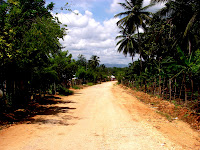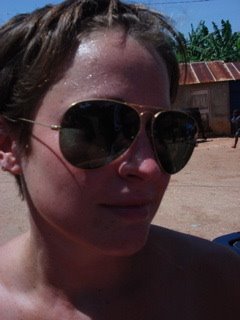First of all, I want to apologize to all of you who have been reading my blog diligently over the last year. It has been far too long since I have kept most of you abreast of what I have been up to. Life has been pretty crazy down here in the DR since late November, that is for sure. I was able to go home for 3 weeks over Christmas, which many of you know because fortunately I was able to see a lot of my friends and family. For those who I missed, I apologize profusely and I encourage you to channel that disappointment into a redoubled effort to make a trip to the DR. Ever since I got back from my vacation though, I have been unbelievably busy, which is a good thing, but it is also very tiring. One of the main reasons my work load has increased so much is that my project partner, a volunteer named Alysia who works as a small business volunteer with the cacao cooperative, was in a horrific car accident on January 8 in which she was thrown out of an out of control truck and cracked her spine.

Alysia was working as a translator for a medical mission of doctors and nurses from the United States when she suffered her injuries. Medical missions are one of the most popular secondary projects that Peace Corps volunteers undertake during their service. We are allowed to participate in one mission a year for one week, and there are on average about 5-6 missions available to volunteers a year. Missions vary in specialty from eye surgeries, hernias, plastic surgeries, and general medicine. Many volunteers say that these opportunities are some of the most gratifying experiences of their Peace Corps service. The style of mission varies greatly however, depending on the participation medical group. The surgeries are performed in hospitals in the largest two cities, but the general medical services are often performed in rural areas. It was on one of the latter missions that Alysia suffered her injuries. She and three other

volunteers were working with doctors and nurses that were traveling to rural communities around Santiago to administer routine medical checks and provide medicine. This group had been visiting the same communities every year for the last 10 years and had formed a sustained medical history with the community members they visited. However, this year the Cibao Mountain region that they were traveling in had received record rainfall, and the steep dirt roads had become increasingly difficult to maneuver due to mud. Many vehicles without four-wheel drive found the roads unpassable. The medical mission had been traveling in a convoy of 4x4 pickup trucks and larger Daihatsu front-wheel drive flatbed trucks. On the second day of medical visits, the group was traveling to a very high mountain community that had suffered a lot of rainfall in the previous week. The 4x4 trucks were able to maneuver the hill, but the flatbed was having trouble. The driver tried to downshift to no avail, and then decided to put it in reverse to attempt the ascent from the bottom a second time. However, when the truck was put into reverse, the engine, power steering, and brakes locked up and the driver was not able to get control of the vehicle. The truck began to slide backwards down the hill and when it

reached a curve in the road, it slid off the side of the mountain. The truck flipped twice with the driver and two passengers inside, throwing the 6 people in the back of the truck overboard. Alysia suffered the mildest injuries of all of the victims and due to adrenaline was able to send local villagers up the mountain after the other trucks for help. It was only a couple days after the accident that the full extent of her injuries became apparent. However, one of the medical students in the truck suffered a blunt force trauma to the head and died instantly on the scene, and another doctor suffered from a ruptured spleen and had to be operated on immediately. Alysia has been in

Washington, DC for the last two weeks receiving medical attention, and we hope that she will rejoin us here in the beginning of March. Amazingly, despite their traumatic experience, the remaining medical team continued their work in the area for the next two weeks, though changed their policy and had the trucks go to the remote communities and bring the patients into the cities for treatment.
Alysia’s accident was particularly upsetting because it happened a week before the inauguration of her primary project with the cacao cooperative, a

cocoa powder processing initiative. Through a grant from USAID, the cooperative is now able to market and sell 100% organic cocoa powder processed from their own cacao farms within the Dominican Republic. We are now in the process of investigating US markets as well. Many of you whom I had the pleasure of seeing during Christmas have a sample of this cocoa powder, and if you email me (escairns@gmail.com), I can send you a list of easy recipes for dishes that you can make with it. Until Alysia returns from the US, I am working with the cooperative on their business plan and continued marketing of their cocoa. This weekend marked the 45th anniversary of the Peace Corps work in the Dominican Republic, and the first major sale of cocoa powder by my cooperative. We sold over 300 bags during the anniversary celebration and made many good contacts that we will be using for both Dominican and North American markets. In the next

year we hope to open our market to bulk sales to Dagoba Chocolate in the US. All in all though, we are off to a good start. The sales of the cocoa are helping pay for the organic certification program as well. Through IMO Caribe, a Swiss chocolate buyer here in the Dominican Republic, we have 97 farms certified to sell as organic in the US, Europe and Asia, and we hope to reach 150 farms in the coming year.
Unfortunately, because of all the work I have been doing with the cooperative, my English and Reading classes have suffered in the last two months. It has also been difficult to get my students back on track after the New Year. Due to a combination of high levels of rain, teacher strikes, and vacation time, the students had over two months without school between November and February, and are only now being tested on the material they learned in the fall. I don’t have to tell you all again about how I feel about the public education system in this country. However, I have already committed to my community to summer school from June to August for both English and Reading classes. That way will

have full use of the school and hopefully help the students maintain the knowledge they learned during the school year. I am also beginning a Healthy Families course with my mother’s group. The course will be once a week for ten weeks, covering nutrition, hygiene, water sanitation, trash disposal and family planning. Each participant will pay approximately $3 a week to attend the course, and at the end of 5 weeks will receive a biosand water filter donated by the Rotary Club. At the end of 10 weeks, they will receive a ceramic woodburning cookstove donated by USAID designed to improve fuel efficiency and limit smoke inhalation. Considering right now most of them are cooking over open flames inside and burning plastic cups and Styrofoam to get the fire going, I think that these will be an improvement. This work, combined with another ro

und of organic certification this summer, should last me until the fall, when I would like to look into a latrine project. I don’t have a grant lined up for that one yet though, so you all might be getting a solicitation email around September. Get ready to start giving!
As of now, I am just sick of traveling, so I am going to go back to my site now and start hanging out with my neighbors so that people will actually come to my meetings. I think that they think that my work is really just going to the beach all the time, and they don’t really get why I am always gone, so I have some trust to regain. Right now my nickname in El Yayal is “la Andariega” instead of “la Americana”. One who travels a lot. I guess I deserve it.
 The
The 




 latrines to address the lack of adequate sanitation facilities in the community, and Improved Ceramic Woodburning Cookstoves to address many of the common health concerns. The community is contributing 35% of the total project costs in the form of labor and raw materials. The Women’s Group of El Yayal initially presented the projects to the community and will oversee the construction and education related to the projects. The committee will also address any problems related to the project and will organize the solicitation of any funds needed for maintenance or new beneficiaries.
latrines to address the lack of adequate sanitation facilities in the community, and Improved Ceramic Woodburning Cookstoves to address many of the common health concerns. The community is contributing 35% of the total project costs in the form of labor and raw materials. The Women’s Group of El Yayal initially presented the projects to the community and will oversee the construction and education related to the projects. The committee will also address any problems related to the project and will organize the solicitation of any funds needed for maintenance or new beneficiaries.


















